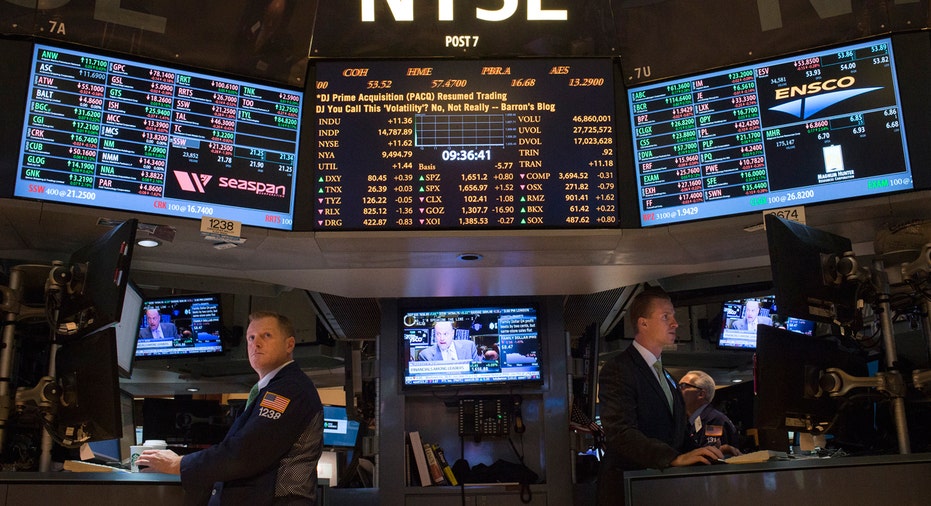Rally Reversed: Stocks Flat Line as Oil Drops

It was a seesaw session for the markets on Tuesday as the major averages were tugged between gains and losses by worries over a persisting global supply glut of oil, and fresh market stimulus in China.
The Dow Jones Industrial Average rose 27 points, or 0.17% to 16015. The S&P 500 gained 1 point, or 0.05% to 1881, while the Nasdaq Composite shed 11 points, or 0.26% to 4476.
Utilities, consumer staples, and telecommunications were the sectors in positive territory, while energy dropped 3%.
Today's Markets
It was the rally that wasn’t on Wall Street. The major averages, at the opening bell, booked gains of more than 1%, but they couldn’t be sustained. By the close of trade, the Dow and S&P managed to end in positive territory after zigzagging through the final hour. The Dow say a 271-point swing during the session.
Global oil prices were the main culprit for the volatility as U.S. crude dropped more than 3% in the final half hour of trading.
The American benchmark, West Texas Intermediate crude, dropped 3.26% to $28.46 a barrel. It was the largest two-day percentage decline in more than a year, and the lowest settlement value since September 2003.
Meanwhile, Brent, the international benchmark, declined 0.74% to settle at $28.76 a barrel on the session.
Tuesday’s action came after prices in the prior session dropped below $28 a barrel for the first time since 2003. Though U.S. equity markets were closed in observance of the Martin Luther King Jr. holiday on Monday, the commodity continued electronic trading.
Adding to anxiety was concern Iran would begin producing more oil now that U.S. and European Union economic sanctions on the nation have been lifted, especially as China, the world’s second-largest consumer of oil, is slowing.
Commodities analysts at Macquarie Research said the short-term impacts of the lifted sanctions are limited.
“While Iran can increase exports in the near term, largely by drawing down on floating and conventional storage, the near-term impact to the physical market is likely to be small,” a note on Tuesday read.
They estimate Iran has increased its exports by as much as 75,000 – 100,000 barrels per day since the original agreement to lift sanctions was agreed upon in July. Even with the extra supply from Iran, the analysts still expect the market to balance by the third quarter of this year.
“Perhaps the most concerning element of the lifting of sanctions is the $100 billion to $150 billion of previously frozen assets that will be returned to Iran. While this is certainly a positive for Iran’s economy…the vast amount of assets returned to Iran could result in investment in its upstream oil sector rise faster than we have modelled,” they said.
Furthermore, the International Energy Agency said Tuesday morning warm weather leading to less demand, and rising supplies are likely to keep the oil market oversaturated until late this year. The IEA report said the oil market still faces the prospect of a third-consecutive year of supply exceeding demand by one million barrels per day.
More China Woes
Global stocks rallied early Tuesday before the U.S. averages dropped back into the red. The biggest reason for the positive momentum: China.
Early Tuesday, the People's Bank of China, the nation's central bank, said it planned to add 600 billion yuan into the market through medium-term lending facility, and slash the MLF rate to 2.75%.
The move came after data showed the Chinese economy grew less than expected in the final quarter of 2015. Gross domestic product in the nation grew 6.8% in the fourth quarter, down from a 6.9% pace during the same period the year prior. The reading matched economists' expectations, but was the weakest pace of growth for the Chinese economy since the first quarter of 2009 when the world was rooted in financial crisis.
Meanwhile, industrial production slowed by 0.3 percentage point in December to 5.9%.
IG market analyst Joshua Mahony said while the PBoC's move has jolted global markets, investors should still exercise caution.
"While this provides a backdrop for further stimulus out of the PBoC, the markets are growing increasingly skeptical about any such move, given the relatively ineffective actions taken by the Chinese regulators and central bankers in the past," he said in a note.
The Euro Stoxx 50, which tracks large-cap companies in the eurozone, jumped 1.54%. The German Dax gained 1.50%, while the French CAC 40 jumped 1.97%, and the UK’s FTSE 100 rallied 1.66%.
Elsewhere in the market, on the earnings front, two of the nation’s biggest banks were out with their quarterly report cards ahead of the bell. Morgan Stanley (NYSE:MS) revealed a beat on both lines, while Bank of America (NYSE:BAC) also posted a beat, but said it was worried about weak oil prices.
Meanwhile, luxury jewelry retailer Tiffany (NYSE:TIF) came under pressure, hitting a fresh 52-week low, after reporting a drop in holiday sales and announced job cuts.



















